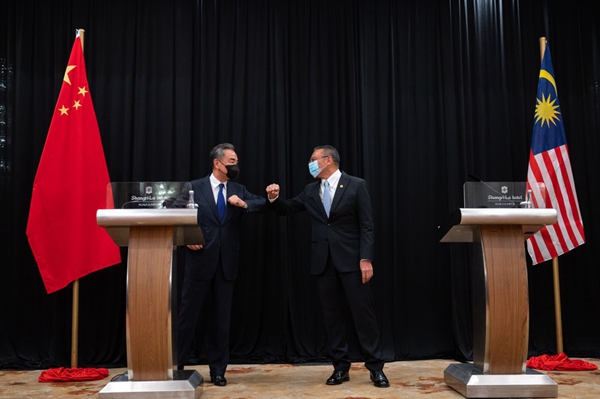US Indo-Pacific strategy undermines peace, development prospect in East Asia: Wang Yi
 0 Comment(s)
0 Comment(s) Print
Print E-mail Xinhua, October 14, 2020
E-mail Xinhua, October 14, 2020

Chinese State Councilor and Foreign Minister Wang Yi said on Tuesday that the so-called Indo-Pacific strategy proposed by the United States would undermine peace and development prospect in East Asia.
In response to a question on the impact of the U.S. Indo-Pacific strategy on the East Asia cooperation, Wang told a joint press conference with Malaysian Foreign Minister Hishammuddin Hussein that East Asia is the most dynamic region in today's world, and is also the economy with the biggest potential going forward.
The success that East Asia has achieved over the past years lies in the continued commitment to the Asian values of solidarity and coordination, lies by following the trend of the time towards globalization, lies by staying on the right path of pursuing multilateralism and of pursuing regional cooperation framework with ASEAN (Association of Southeast Asian Nations) at the center, Wang said.
Faced with the once-in-a-century change and the COVID-19 pandemic, in order to maintain the hard won peace and stability in East Asia as well as for East Asia to enjoy continued development and prosperity, countries must continue to stay committed to these values and cooperation formats that have proved effective over the years, he said.
Wang pointed out that the Indo-Pacific strategy proposed by the United States is in essence aimed at building a so-called Indo-Pacific "new NATO" underpinned by the quadrilateral mechanism involving the United States, Japan, India and Australia.
The strategy is to trumpet the old-fashioned Cold War mentality to stir up confrontation among different groups and blocs and to stoke geopolitical competition, in a bid to maintain the dominance and hegemonic system of the United States, he said.
The strategy contravenes the spirit of mutual benefit and win-win spirit that has been pursued by East Asia cooperation, impacts the regional cooperation architecture with ASEAN at the center and it will eventually undermine the prospect of peace and development of East Asia, he said.
Wang further pointed out that the strategy itself is a big underlying security risk. If being forced forward, it would not only wind back the clock of history, but also mark the beginning of danger, so he believes that all parties could see this clearly and will stay vigilant against it.
Wang stressed that the future of a region should be determined by the people in that region. East Asian countries have the right to achieve their own development and stability, as well as the right to pursue independent foreign policies.
China is an important member of East Asia, a good neighbor and good partner of ASEAN, he said. China has all along supported ASEAN's development and growth and has been firmly supporting ASEAN's centrality in regional cooperation and firmly committed to peace and stability in East Asia.
Going forward, China will continue to pursue a neighborhood diplomacy characterized by amity, sincerity, mutual benefit and inclusiveness and make positive contribution to enduring peace and greater development of East Asia, he said.






Go to Forum >>0 Comment(s)